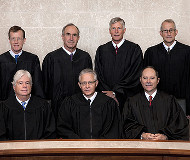Article from: www.thenewspaper.com/news/65/6541.asp
9/5/2018
Iowa Supreme Court Splits On Speed Cameras
One out of three new Iowa Supreme Court rulings on speed cameras opens door to a challenge of photo radar legality.
 The Iowa Supreme Court on Friday wavered on its automated ticketing position in a trio of decisions. Since 2008, the high court has been unconditional in accepting the use of private, for-profit companies to send tickets in the mail to motorists. Two of Friday's rulings (Leaf v. Cedar Rapids, view decision in 150k PDF file) and Behm v. Cedar Rapids, (view decision in 400k PDF file) maintained this status quo, but the third (Weizberg v. Des Moines) revived a class action lawsuit against photo ticketing.
The Iowa Supreme Court on Friday wavered on its automated ticketing position in a trio of decisions. Since 2008, the high court has been unconditional in accepting the use of private, for-profit companies to send tickets in the mail to motorists. Two of Friday's rulings (Leaf v. Cedar Rapids, view decision in 150k PDF file) and Behm v. Cedar Rapids, (view decision in 400k PDF file) maintained this status quo, but the third (Weizberg v. Des Moines) revived a class action lawsuit against photo ticketing.
The court noted its misgivings about the wisdom of photo enforcement.
"We are troubled by other facts in this record," Justice Brent R. Appel wrote in Behm. "Cedar Rapids reaps large amounts of money from the automated traffic enforcement system -- millions of dollars per year. If promoting safety were Cedar Rapids' real goal, why does the ordinance penalize vehicle owners and not the drivers where the deterrence function would be much greater? The idea that vehicle owners will be more careful allowing others to drive their vehicles seems tenuous at best."
The court also questioned the placement of speed cameras after the "hazardous" S-curve rather than before it. As a legal matter, however, the court could not find the system was illegal because the court's legal review must be deferential to the city's policy choice.
"That said, the mere incantation of the abracadabra of public safety does not end the analysis," Justice Appel noted. "It is possible to imagine a scenario in which the challenger develops a factual record that demonstrates an automated traffic enforcement system as implemented is so attenuated and remote from public safety concerns and is simply designed to raise revenues for the city that it violates rationale basis analysis."
Behm was not the case for such a challenge. The case only left open the question of whether a city must formally file a municipal infraction case -- paying court fees -- before attempting to collect on an unpaid ticket. The Weizberg case introduced a more substantial challenge that will be sent back to the trial court.
"The district court should have allowed the plaintiffs to attempt to show factually that there is no rational safety argument to support the particular placement of automated traffic enforcement cameras on I-235," Justice Appel wrote.
The court placed a high bar to success on that point. The lawyers for motorists must show the claimed safety interest is "not plausible" and not "based in fact." The high court determined that the trial judge made a procedural mistake in dismissing the claim out of hand.
A copy of the Weizberg ruling is available in a 200k PDF file at the source link below.
Source: Weizberg v. Des Moines (Iowa Supreme Court, 8/31/2018)
Permanent Link for this item
Return to Front Page
 The Iowa Supreme Court on Friday wavered on its automated ticketing position in a trio of decisions. Since 2008, the high court has been unconditional in accepting the use of private, for-profit companies to send tickets in the mail to motorists. Two of Friday's rulings (Leaf v. Cedar Rapids, view decision in 150k PDF file) and Behm v. Cedar Rapids, (view decision in 400k PDF file) maintained this status quo, but the third (Weizberg v. Des Moines) revived a class action lawsuit against photo ticketing.
The Iowa Supreme Court on Friday wavered on its automated ticketing position in a trio of decisions. Since 2008, the high court has been unconditional in accepting the use of private, for-profit companies to send tickets in the mail to motorists. Two of Friday's rulings (Leaf v. Cedar Rapids, view decision in 150k PDF file) and Behm v. Cedar Rapids, (view decision in 400k PDF file) maintained this status quo, but the third (Weizberg v. Des Moines) revived a class action lawsuit against photo ticketing.